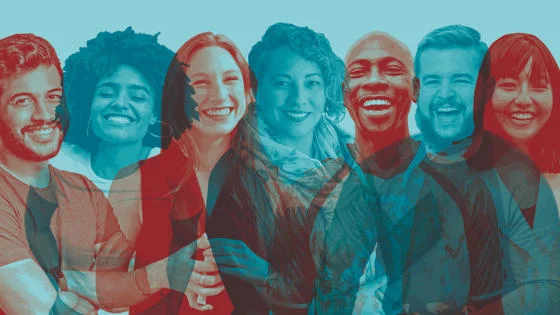Using people’s feelings of happiness to make better policy decisions

Contents
Who among us hasn’t weighed up the value of attending an event that required a long commute, or found themselves in a bad mood due to being stuck in traffic? But while it's obvious that some activities will bring us joy and others only frustration, translating this understanding into data that can help guide policy decisions has historically proved difficult. The question of how best to value time – and time savings – is an important one however, particularly for policymakers required to carry out cost-benefit analyses before deciding which projects to approve.
It’s this question that Dr Christian Krekel, an Assistant Professor in Behavioural Science at LSE, and Dr George MacKerron, a Senior Lecturer in Economics at the University of Sussex, have been exploring. Their paper, "Back to Edgeworth? Estimating the Value of Time Using Hedonic Experiences", proposes a new method for estimating the Value of Time (VOT) – "experiential valuation" – and calculates, for the first time, VOTs for a wide range of common activities such as walking, commuting and socialising.
We are essentially looking at people’s experiences while in a particular moment, and particularly how happy they feel in that moment.
One of the reasons it has previously proved difficult to calculate a reliable VOT, Dr Krekel explains, is that studies have had to rely on either stated preferences – when subjects are directly asked to provide their valuations based on hypothetical situations – or revealed preferences – which are based on observational studies. While these have enabled researchers to estimate VOTs, both approaches are limited by a reliance on the assumption that people will act rationally and with perfect foresight. Dr Krekel and Dr MacKerron, however, had access to a unique data source, enabling them to calculate, for the first time, VOTs based on people’s "hedonic experiences" – how happy they were – in real time.
"We are talking about using people’s feelings to measure the VOT – so their subjective wellbeing," says Dr Krekel. "Subjective wellbeing is thought to have two dimensions: one, cognitive evaluations like life satisfaction – so if I ask you to report your life satisfaction that makes you cognitively reflect on your life relative to some kind of ideal version. But there is another dimension – our affective experiences – and this is what we are focused on in our paper. So we are essentially looking at people’s experiences while in a particular moment, and particularly how happy they feel in that moment."
Back to Edgeworth?
The idea of sampling people’s hedonic experiences in real time can be traced back to 19th-century economist Francis Y Edgeworth, Dr Krekel explains, who argued that, at some point in the future, we would have the technology to measure utility on a physiological basis.
"Edgeworth was probably thinking more of some sort of apparatus that would connect to our body to measure utility," says Dr Krekel. "We obviously don’t have that yet, but we do have the Mappiness app, which brings us quite close to this, because through the app we can ask people about their happiness randomly throughout the day and record how they are actually feeling in that moment whilst doing something or being somewhere."
The Mappiness app, developed by Dr MacKerron during his PhD studies at LSE jointly with Professor Susana Murato, current Vice-President and Pro-Vice Chancellor (Research) at LSE, provided the researchers with eight years of longitudinal data from over 30,000 people around the UK (roughly 2.2 million observations). The app asked users how they were feeling and what they were doing at random points in time throughout the day, providing a rich data set and enabling the researchers to learn more about how people actually felt at the time of each activity.
Through modelling, the researchers were then able to identify how people felt when carrying out 42 daily activities (including commuting or travelling, working or studying, shopping, listening to music, and browsing the internet) and calculate a monetary value for each activity.
"People have traditionally been putting monetary values on things using life satisfaction, but we are the first using hedonic experiences in real time. From the data we know how happy people are feeling when they're doing certain activities, and we know how much money makes them feel happy, so we can basically trade off these two against each other," explains Dr Krekel.
"In other words, we calculate the marginal rate of substitution in economic terms between an activity and income, and then we simply standardise it to one hour – because VOTs in the economics literature are usually standardised to the hour – and this allows us to see, in monetary terms, what 60 minutes of each activity is worth." The final step is to subtract from the monetary value of each activity the weighted share of the monetary values of all the other, remaining activities, as a counterfactual of what people could be doing otherwise.
People have traditionally been putting monetary values on things using life satisfaction, but we are the first using hedonic experiences in real time.
Waiting is bad for our happiness
While Dr Krekel and Dr MacKerron were not particularly surprised by the activities found to have the most value to people – those that people enjoyed the most – there were some findings around the more unappealing activities that could be of particular use to policymakers. "Activities like certain cultural events – for example, sporting events or the cinema or dancing – we found to have the highest value of time for individuals. That wasn’t a surprise as you’d assume that people enjoy these activities and so would have to be compensated with a higher monetary payment if they weren't able to do them."
"What was particularly interesting to us, however, was the impact of having to wait. Waiting hasn’t tended to be examined in literature around VOTs so we wanted to explicitly understand the impact of waiting, and we found that having to wait extra time turned out to be an activity that people really hate."
"Waiting or queuing" was, in fact, found to have a strong and significant negative impact on happiness, ranking as the third least enjoyable activity, and surpassed only by "being sick in bed" and "care or help for adults". The VOT shows that spending 60 minutes waiting or queuing, as opposed to doing something else, is found to be worth £-12.20 per hour; commuting £-8.40 per hour; and, for many the most frustrating activity of all, waiting during commuting (such as being stuck in congestion), a huge £-17.20 per hour. The negative sign of the VOT suggests that people would need to be compensated by that amount if they had to spend one hour in the respective activity.
These high costs suggest that respondents would be better off spending their time doing something else. Or, as Dr Krekel says, "Someone who is waiting for 60 minutes would need to be compensated £12.20 to achieve the same level of happiness if they were not waiting. That actually was surprising to us – we didn’t think it would be that bad, but when we looked at the VOT of all the other activities, the data show that having to wait made all the other activities less pleasurable."
The calculated VOT for selected daily activities are listed below, while the VOT for all 42 daily activities, as well as their interactions, can be found in tables 2 and 3 in Dr Krekel’s discussion paper).
Our figures will help policymakers identify which interventions might be most cost-effective at a societal level.
"Why should we pay for that?" How our (un)happiness can be used for cost-benefit analysis
This new method of calculating VOT using people’s actual feelings in real time will provide great robustness to policymakers needing to decide how best to allocate resources. "This is the first time that policy can actually get monetary estimates from people’s actual feelings in real time, which can be used in, for example, social cost- benefit and cost-effectiveness analyses by government," says Dr Krekel.
This is important as it allows us to quantify the benefits associated with investments into time-saving infrastructure, helping policymakers to make informed decisions over where best to allocate resources. By showing how impactful waiting and commuting are on the population, the paper makes a strong case for investment in projects that would reduce the time people spend doing these activities, although this can sometimes be tricky, Dr Krekel admits: "Sometimes it might not be possible to reduce waiting times, but to a certain extent it might actually be possible and it helps us identify where gains can be made."
"If you think about waiting times in the NHS, for example, or if you think about waiting times in transportation, there are things that can be done. Some may be prohibitively expensive, but others, like optimising schedules, or training people to make better use of their time, may be less so. Our figures will help policymakers identify which interventions might be most cost-effective at a societal level."
The authors hope that the UK Government agrees, and that using people’s hedonic experiences in real time will, eventually, inform official UK Treasury guidelines for policy appraisal and evaluation. Dr Krekel’s previous recommendations on using people’s self-reported life satisfaction (or WELLBYs, that is, one point of life satisfaction for one person for one year), have already been included in the UK Treasury’s Green Book, which provides guidance on how to analyse policies.
"Our work has actually contributed to making this part of the official government guidelines," says Dr Krekel. "Currently only life satisfaction and cognitive evaluations are in there, but I'm hoping of course that with the next revision that is coming, we can ensure that experiential evaluation is also included."
With Dr Krekel also working on several projects with the UK Government exploring value for money of different policy options, it is clear that this is not the end of the project to ensure that policy decisions are based on evidence that considers not just cost, but the impact on the wellbeing of all who stand to benefit.
Dr Christian Krekel was speaking to Jess Winterstein, Deputy Head of Media Relations at LSE.
Download a PDF version of this article




